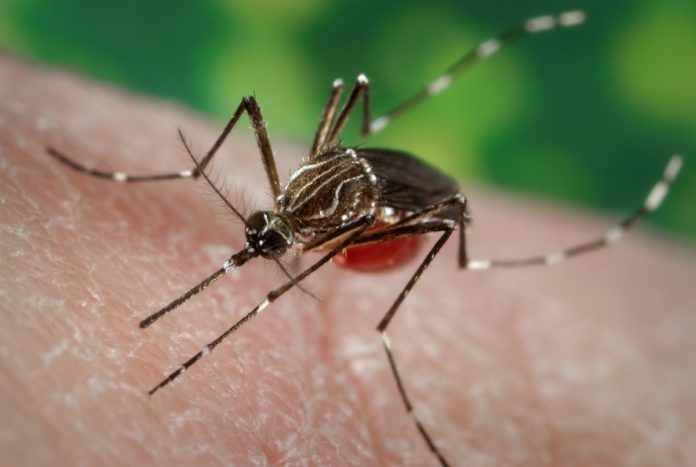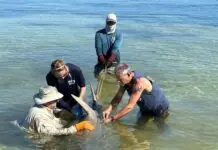
On Aug. 18, the Florida Keys Mosquito Control Board voted 4-1 in favor of a genetically modified mosquito trial for the Florida Keys. A geographic location has yet to be identified, and the trial will begin after Jan. 1, 2021.
“We heard all the hypotheticals of what a male GMM flying around you may do, but we know exactly what an infected wild female Aedes aegypti mosquito will do. Unfortunately, the need for new technology is now even more evident with the current dengue fever outbreak in the Upper Keys. There are other regions of the Keys with even higher risks so we should not waste more time,” said Phil Goodman, chair of the FKMCD board. “We now have the regulatory approvals for safety and we finally have the chance to determine if it works locally. If it does, this may be a real game changer for mosquito control in the Keys and the world.”
Oxitec CEO Grey Frandsen said, “Our team is ready to get to work. We couldn’t think of a better partner than the FKMCD, and we’re looking forward to working with the Keys community to demonstrate the effectiveness.”
FKMCD board member Dr. Stanley Zuba compared the tactics of those opposed to the plan to anti-vaxxers.
“The techniques used by the opposition to this (trial) are extraordinarily similar to the techniques used by the anti-vaccine movement such as misinformation on side effects, misinformation on vaccine ingredients, deaths or disability due to vaccines, and conspiracy theories relating to big corporations and big pharma,” Zuba said. “I took a vow over 30 years ago when I became a doctor and that was, in part, to do no harm. … If I had one iota of doubt about the safety of this study I would vote ‘no’ in an instant. However, I do not.”
Board member Brandon Pinder cast the only dissenting vote. He said if the reason for delaying the vote last month was due to increasing COVID-19 cases, then the board should continue to delay. Zuba countered, stating that the rate of new positive cases is “substantially down.”
More than 30 speakers signed up for the Zoom meeting. Five spoke in favor, including veterinarian Dr. Douglas Mader.
“I am fully behind Oxitec. I see mosquito-borne disease every day — that’s what causes heartworm in dogs, cats and ferrets,” Mader said, adding that he recently diagnosed a horse infected with West Nile, also a mosquito-borne disease, that must be put down. “It’s one thing to talk or hear about it, and another to see an animal die from a preventable disease.”
Many speakers reiterated the anti-GMM slogan: “I do not consent.” And toward the end of the meeting, at least one citizen refused to mute his microphone during the board discussion and spoke over the elected members: “We will not be muted.”
Isabel Sam, who described herself as a mainland nanotechnology scientist, asked the board to delay the vote and trial and ask Oxitec to hand over the science to a third-party audit team. “We have nothing to lose by studying this technology for five years,” she said. Her plea was reiterated by Kristi Carter of Tavernier. “Let’s give it to a third party. Also, I am okay with another referendum.”
In 2016, voters responded to two genetically modified mosquito questions. The first was directed at voters in the Key Haven neighborhood, who rejected the area as a trial site for Oxitec’s first generation technology. The second question, directed to the rest of the Keys, was approved by 58% of voters, signaling a willingness to use the technology in their own backyards.
“This is what I am asking: let’s put this back on the ballot for 2020,” said Katie Abate.
“Please let it go to referendum,” said Upper Keys resident Elizabeth Jolin. “Let the community accept the burden of this decision.”
“This technology is a better alternative than insecticide. … What do we have to lose?” asked Keys resident Ashley Johnson. Board member Jill Cranney-Gage echoed the sentiment when addressing the meeting participants. “You don’t like pesticides, and we’re running out of options.”
No board member spoke in favor of having another referendum on the genetically modified mosquito.
Speaker Eric Anderson noted that the board was created to make these types of decisions. “I don’t want the general public to make these decisions on my behalf, because some of them would vote out of fear,” he said. “I have listened to the arguments on both sides and heard lots of ‘Jurassic Park’ and conspiracy theories and fear tactics. I am for real science and the release of the genetically modified mosquito.”
“This is our job and our job alone. It is clear that we need new technology. Unfortunately the proof that our current control method is not adequate is the fact that 47 Keys residents have been infected with dengue,” Goodman said.
The trial will be conducted at no cost to the taxpayers of Monroe County; it will be paid for by Oxitec. The CDC has agreed to monitor the trial and evaluate the results.























